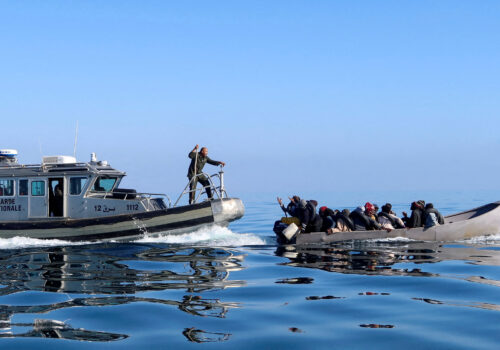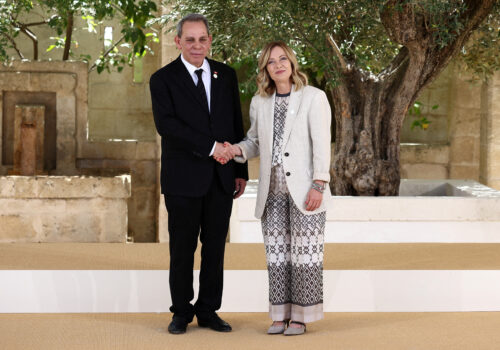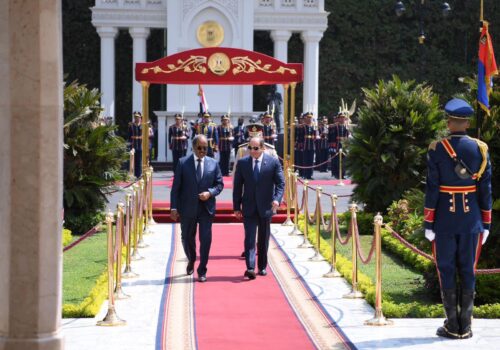The end of Libya’s false stability period
Libya’s three years of “unstable” stability appear to have reached their much-anticipated tipping point. In late August, the initial entente between Prime Minister Abdul Hamid Dbeibah’s clan and Libyan Central Bank (CBL) Governor Saddik al-Kabir came to an end when armed forces, acting on Dbeibah’s orders, stormed the CBL headquarters. However, the governor managed to flee to Turkey with his trusted collaborators and the codes that control the bank’s operations. To put further pressure on Dbeibah, General Khalifa Haftar’s army, which surprisingly sided with Kabir, shut down key oil fields since August, creating a crisis that paralyzed the government in Tripoli. The international community must act rapidly and effectively to prevent an all-out war between the various Libyan militias and their foreign backers, which could inflame the already explosive Middle East and North Africa.
Tensions have remained high in the western region of Tripoli since 2019–2020, when fighters defended the Libyan capital from Haftar’s army—with crucial help from troops sent by Turkish President Recep Tayyip Erdogan. One of the main reasons for the current unrest is Dbeibah’s refusal to resign, despite his Government of National Unity (GNU) having failed at the core purpose for which it was appointed: organizing free and fair national elections. Public perception of the GNU has shifted from welcoming Dbeibah’s appointment in 2021 to seeing it as a “kleptocracy” aiming only to appropriate national resources for its enrichment.
SIGN UP FOR THIS WEEK IN THE MIDEAST NEWSLETTER
The GNU’s legitimacy derives mostly from its having been created by the United Nations-led Libyan Political Dialogue Forum (LPDF), an assembly of Libyan citizens empowered by the United Nations (UN) to elect a prime minister and discuss related issues. Surprisingly, in 2021, the UN special adviser on Libya, Stephanie Williams, agreed to have the House of Representatives (HoR) ratify the prime minister’s appointment, thus giving the parliament a power it was not supposed to have anymore. Elected in 2014 by less than 20 percent of those registered to vote, the parliament should have been dissolved by now given its four-year mandate. But with the ongoing security risks and political turmoil, elections were never called and, thus, no replacement was possible—extending parliament’s mandate indefinitely. While the HoR—established in Tobruk in territory controlled by Haftar—initially ratified the GNU, it later withdrew its recognition in favor of a Government of National Salvation (GNS), established in the eastern province, loyal to Haftar, and a pseudo-government that opposes the GNU and legitimizes the general’s role.
In the east, Haftar holds all military power and Libyan Parliament Speaker Aguila Saleh exercises political power only with approval from Haftar. In the West, however, the situation is more fragmented because of the dynamics established by the first civil war (2014–2016). The first elected assembly, the General National Congress (GNC) elected in 2012, did not disband with the election of the Libyan parliament. Instead, in 2018, the LPDF transformed it into a second chamber, the High State Council, which was supposed to have only advisory powers. With time, these powers had more influence than originally intended. (The HSC has been accused of being dominated by the Muslim Brotherhood, but this has never been proven, even though its head, Khaled al-Mishri, is undoubtedly a Brotherhood sympathizer.) The other key institution is the GNU, led by Dbeibah, who is well known for power grabbing through politicking and manipulating different stakeholders to remain in office at any cost for as long as possible.
These institutions exist within a framework formed by numerous armed militias, each with the support of a foreign power. After Haftar’s defeat in Tripoli in 2020, the situation in Libya hung in an uneasy balance, but this year could well be the one to change the course of Libyan history.
Complicating matters is the influence of foreign backers. Toward the end of 2023, Haftar’s Libyan National Army (LNA) received a large amount of weapons and military equipment from his Russian allies. It is now ascertained that part of that military hardware was to go to Haftar’s army, the Libyan National Army (LNA), with the rest designated for the new Russian contractors’ company, Africa Corps, which has replaced the Wagner Group. While theoretically independent, the company is a direct emanation of the Kremlin. The weapons received by the LNA were evidently enough to rearm and equip its troops. In recent months, the LNA has moved south, occupying large amounts of territory, and has been rapidly moving toward the border of Algeria and toward the GNU-controlled city of Ghadames. This is causing divisions among authorities in Tripoli, who fear another attack by the eastern general. The Algerian government, alarmed by the prospect of an army closely allied with Egypt at its borders and in control of almost the entire country of Libya, put a stop to this movement, at least temporarily.
In reality, the threat of an attack by Haftar could be understood more as a pretext than a cause for the militias and politicians’ agitation over the past two weeks. The lack of sympathy, if not open hostility, between Kabir, the extremely competent and internationally respected governor of the Central Bank of Libya, and Dbeibah is well known. Dbeibah continues to ask that the CBL release its hold on its finances and allow the government to obtain the funds needed to conduct its business and operations. Kabir understands the prime minister’s not-so-hidden intention to have access to the bank’s reserves for himself and his acolytes. This is the real reason for the confrontation, which has only recently evolved into a potential military clash between Dbeibah’s militia supporters and those who support the governor.
While the United States and a handful of European states condemned the act of surrounding the central bank with strong words in defense of Kabir, this is not enough. In Libya, whoever controls the purse strings controls the country, so the war around the CBL will continue—at least in the short term.
Foreign regional powers remain crucial to developments in Libya. From late 2019, these foreign powers’ control over their various Libyan proxies moved from absolute to lesser control. Haftar has managed—to a certain degree—to play his backers Egypt and Russia against each other by flirting with Moscow anytime he felt that Cairo’s support was waning. While the militias of Misrata, for example, counted on the support of Qatar, Italy, and, to an extent, the United States and the United Kingdom, and exacted many resources by playing on the rivalry between these powers and Turkey, another important supporter of Misrata and Tripoli.
The United Arab Emirates (UAE) today—unlike a few years ago, when its level of intermingling was high—seems to have taken a step back and is observing ongoing developments as Abu Dhabi determines how and whether to engage and how to ensure its strategic interests. In the struggle between Dbeibah and Kabir, foreign powers are divided, with the United States, the UK, most European countries, and Turkey supporting Kabir. According to some close to the author, Dbeibah believes he has the support of Saudi Arabia, the UAE, and France, but this remains to be seen. It is easy to see how volatile this situation is.
The real turning point was Haftar’s unexpected declaration of support for Kabir. The bank governor’s recent wiring of funds to Haftar’s bank to pay LNA soldiers and mercenaries, as well as some of the construction projects initiated by Haftar’s sons, are not enough for Haftar to undertake such a 180-degree turn, however at the moment, any hypothesis is possible and realistic.
The United States, beyond mere words of condemnation, should take the lead in fostering a closer coalition of countries that could push the Dbeibah clan out and facilitate the appointment of a new prime minister and cabinet determined by the HoR. Kabir should be reinstated at least temporarily in his position as the governor of the Central Bank. Italy, too, has the potential to play a relevant role in pushing for a stronger rapprochement between Egypt and Turkey. Such a détente could resolve many difficult crises. However, even if all internal and foreign players align, the level of anarchy and fragmentation reached in Libya will still make resolution a difficult endeavor.
Karim Mezran is director of the North Africa Initiative and resident senior fellow with the Rafik Hariri Center and Middle East Programs at the Atlantic Council.
Further reading
Tue, Jun 25, 2024
A world in crisis is good news for North Africa’s political elites
MENASource By Alia Brahimi, Karim Mezran
Europe should not assume that increasing transactional dealings with these elites will produce stability on its southern frontier.
Mon, Jul 29, 2024
The Mattei Plan is an opportunity for North Africa
MENASource By Karim Mezran
North Africa is particularly vulnerable, and the Mattei Plan can positively defuse regional tensions.
Thu, Sep 19, 2024
Egypt is cozying up to Somalia to thwart Ethiopia
MENASource By Shahira Amin
Tensions between Egypt and Ethiopia have escalated after Cairo forged closer ties with Addis Ababa’s rival, Somalia.
Image: Libya’s military strongman Khalifa Haftar (C)attends a conference for the country’s development and reconstruction.


